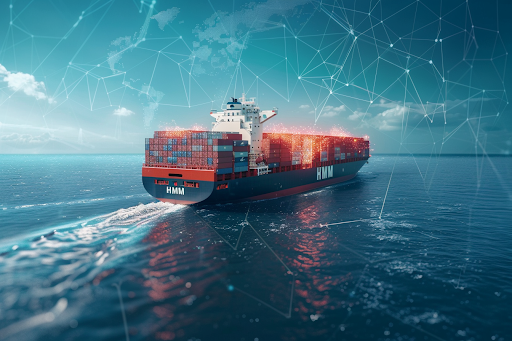
In a significant leap forward for the logistics industry, Bojan Čekrlić, CEO of CargoX, recently announced a wide-scale partnership with HMM (Hyundai Merchant Marine), a leading South Korean container transportation and shipping company. This collaboration marks a pivotal moment in the digitization of logistics documentation, emphasizing the transformative power of blockchain technology.
The Significance of the HMM Deal
The deal with HMM is a milestone for CargoX, representing one of the largest endorsements of blockchain-based digital bill of lading in the logistics sector. Once only associated with cryptocurrency, the underlying blockchain technology has evolved into a critical business tool for supply chain organizations around the world. Čekrlić elaborated on the importance of this partnership during an interview, stating, "For us, we are excited about this because it means a huge step towards achieving interoperability and global supply chain cooperation in digital format."
HMM, being one of the largest carriers globally, brings substantial market influence. This partnership not only validates CargoX's technology but also positions it as a frontrunner in the industry's digital transformation. The collaboration is expected to enhance efficiency, security, and environmental sustainability by significantly reducing reliance on paper documentation. According to Čekrlić, the shift to digital will result in "huge cost savings and reduce CO2 emissions," underlining the environmental benefits of such technological advancements.
Gateway to South Korea and Beyond
The deal with HMM serves as a gateway to broader opportunities in South Korea and potentially with the Korean government. The integration with HMM is seen as a precursor to working with the government on initiatives like the Advance Cargo Information (ACI) system. Čekrlić mentioned, "This has been seen by carriers and governments alike, especially with certain governments pushing efforts towards standardizing electronic documents." This move could lead to wider adoption of digital logistics solutions across the region, setting a new standard for the industry.
Blockchain and Tokenization: Game Changers for Shipping
At the core of CargoX's solution is blockchain technology, which has evolved from a "scare word" to a trusted and integral part of the logistics industry. Blockchain ensures the immutability and security of digital documentation, addressing long-standing issues related to fraud and inefficiency. Čekrlić highlighted that "blockchain is perfect for transferring originals, which we didn't have before," emphasizing its role in ensuring the authenticity and integrity of logistics documents.
Tokenization of bills of lading is another revolutionary aspect introduced by CargoX. Tokenized bills can act as financial instruments, improving liquidity for carriers and opening new financing possibilities. Čekrlić explained, "Using the bill of lading as a token in combination with smart contracts and automated rules, you can do a lot of things which were not possible previously." This includes automated letters of credit and financing of digital instruments, streamlining processes that were traditionally cumbersome and time-consuming.
Evolution and Market Readiness
Since its inception, CargoX has witnessed significant growth in the adoption of digital bills of lading. From having just six suppliers, half of which were blockchain-based, the market now boasts twelve suppliers, all utilizing blockchain technology. This growth reflects the increasing trust and reliance on blockchain solutions within the industry.
One of the challenges CargoX faced was the logistics industry's resistance to change. Čekrlić noted, "Logistics is quite a classic industry, so things really need an effort to change." However, by maintaining a laser focus on specific areas and gradually introducing changes, CargoX has managed to drive significant progress. This approach is evident in their successful integration with the Egyptian government for the ACI system, demonstrating the practical applications and benefits of their technology.
Standardization and Interoperability
A key factor in the success of digital logistics solutions is standardization. CargoX is actively involved in shaping industry standards through the Digital Container Shipping Association (DCSA). Čekrlić highlighted the importance of these standards, saying, "The DCSA focuses on creating a common set of standards on which all the carriers can agree." The transition from PDF to machine-readable JSON files is particularly significant, as it enables automation and further cost savings.
CargoX's involvement in the DCSA ensures that their solutions are not only cutting-edge but also interoperable with other systems in the supply chain. This standardization facilitates smoother and more efficient operations, benefiting all stakeholders involved.
The Future of Digital Logistics
The partnership with HMM solidifies CargoX's position as a leader in the digital transformation of logistics. The use of blockchain and tokenization is set to revolutionize the industry, making processes more efficient, secure, and environmentally friendly. Čekrlić is optimistic about the future, stating, "The only thing we really need is the incentive from the users themselves. The technology, commercial aspects, and legal framework are all here."
As the industry continues to evolve, the benefits of digital logistics solutions will become increasingly apparent. The collaboration between CargoX and HMM is just the beginning, paving the way for broader adoption and implementation of these innovative technologies. By 2030, the goal is to fully digitalize bills of lading, a target that Čekrlić believes is achievable with the right commitment and adoption from the industry.
Charting a Path Forward
In conclusion, the partnership between CargoX and HMM marks a significant milestone in the logistics industry's journey towards digitalization. The integration of blockchain and tokenization technology not only enhances efficiency and security but also opens new avenues for financial innovation. As more carriers and governments recognize the benefits, the shift towards digital logistics solutions will continue to gain momentum, driving the industry into a new era of transparency, sustainability, and efficiency.









